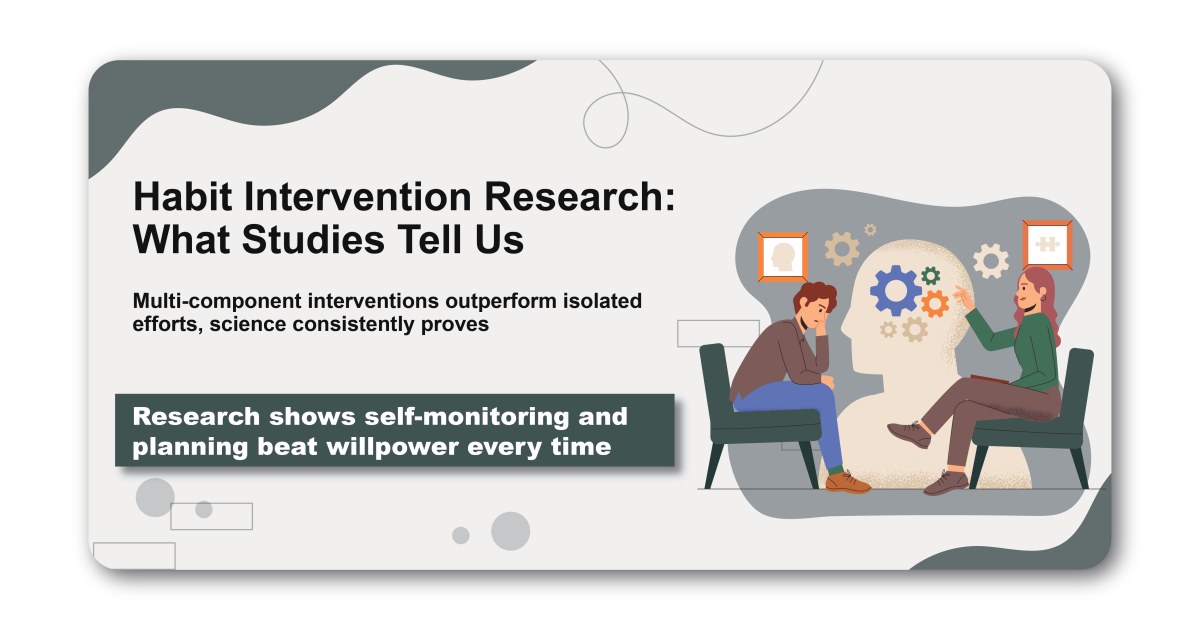The scientific study of habit change interventions has produced a rich body of evidence about what works, what doesn't, and why certain approaches are more effective than others. Through decades of rigorous research involving thousands of participants across diverse populations and settings, we now have a clear picture of the most effective strategies for behavior change. This evidence base provides crucial insights that can transform how we approach habit formation and increase our chances of success.
Habit intervention research spans multiple disciplines including psychology, neuroscience, behavioral economics, and public health. Studies have examined everything from simple individual behaviors to complex organizational change initiatives, from short-term interventions to long-term follow-up studies spanning years. This comprehensive research base allows us to identify patterns and principles that consistently predict success across different contexts and populations.
The most significant finding from decades of research is that there is no one-size-fits-all approach to habit change. However, certain principles and strategies consistently emerge as effective across different studies and populations. These evidence-based insights provide a foundation for designing more effective habit change interventions that are grounded in scientific understanding rather than intuition or popular trends.
Meta-analyses and systematic reviews of habit intervention studies have revealed both surprising findings and confirmation of intuitive approaches. Some widely believed strategies have little empirical support, while others that seem counterintuitive have strong evidence bases. Understanding these research findings can help us avoid common pitfalls and focus on strategies with the highest likelihood of success.
This comprehensive review of habit intervention research provides practical insights for anyone seeking to change their behavior, from individuals working on personal goals to organizations implementing behavior change programs. By understanding what the scientific evidence tells us about effective habit change interventions, we can make more informed decisions about which strategies to pursue and how to implement them most effectively.
Comprehensive Meta-Analyses and Systematic Reviews
Large-Scale Habit Change Studies
What the Numbers Tell Us Large-scale meta-analyses provide the most robust evidence about habit change intervention effectiveness.
Key Meta-Analysis Findings:
- Average effect sizes for different intervention types
- Success rates across different populations and contexts
- Factors that predict intervention success and failure
- Comparison of different theoretical approaches
- Long-term maintenance rates and sustainability patterns
Significant Research Findings:
- Implementation intentions show consistent moderate effect sizes (d = 0.65)
- Self-monitoring interventions demonstrate strong evidence base (d = 0.40)
- Social support interventions show variable but generally positive effects
- Goal-setting alone shows minimal effect without additional components
- Multi-component interventions generally outperform single-component approaches
Population-Specific Insights:
- Age-related differences in intervention effectiveness
- Cultural and socioeconomic factors affecting success rates
- Gender differences in response to different intervention types
- Health status and baseline behavior effects on outcomes
- Educational level and intervention complexity interactions
Intervention Component Analysis
Which Elements Matter Most Research has identified specific intervention components that consistently predict success.
Most Effective Components:
- Implementation intentions and if-then planning
- Self-monitoring and progress tracking
- Environmental modification and cue management
- Social support and accountability systems
- Gradual behavior change and habit stacking
Least Effective Components:
- Education and information provision alone
- Fear-based messaging and negative consequences
- Willpower-based approaches without environmental support
- Complex multi-behavior interventions
- Generic advice without personalization
Optimal Combination Strategies:
- Combining self-monitoring with goal setting
- Integration of environmental changes with social support
- Pairing implementation intentions with habit stacking
- Using feedback systems with progress tracking
- Combining intrinsic and extrinsic motivation strategies
Implementation Intention Research
The Power of If-Then Planning
Most Studied Habit Change Strategy Implementation intentions have been extensively studied across hundreds of experiments with consistently positive results.
Implementation Intention Mechanisms:
- Automatic action initiation following situational cues
- Reduced cognitive load and decision fatigue
- Increased attention to relevant environmental cues
- Stronger cue-response associations
- Improved resistance to distractions and competing goals
Research Evidence:
- Over 100 studies showing positive effects
- Effect sizes ranging from small to large (d = 0.3 to 1.2)
- Effectiveness across diverse behaviors and populations
- Particularly strong for one-time behaviors and goal pursuit
- Moderate effectiveness for complex habit formation
Optimal Implementation Strategies:
- Specific situational cues linked to specific actions
- Realistic and achievable behavioral responses
- Alignment with existing routines and contexts
- Simple, clear if-then formulations
- Regular review and adjustment based on experience
Contextual Factors in Implementation Intentions
When and How If-Then Planning Works Best Research has identified specific conditions that enhance implementation intention effectiveness.
Enhancing Factors:
- Strong commitment to the goal or behavior
- Clear identification of relevant situational cues
- Realistic assessment of behavioral capacity
- Alignment with existing habits and routines
- Positive emotional associations with the behavior
Limiting Factors:
- Weak goal commitment or motivation
- Vague or unrealistic behavioral specifications
- Competing habits or environmental constraints
- High stress or cognitive load conditions
- Lack of opportunity or environmental support
Optimization Strategies:
- Conduct thorough situational analysis before planning
- Test and refine if-then plans based on initial experience
- Create multiple implementation intentions for different contexts
- Combine with other intervention components for maximum effect
- Regular monitoring and adjustment of plans
Self-Monitoring and Feedback Interventions
The Evidence for Tracking
Consistent Research Support Self-monitoring has one of the strongest evidence bases in habit change research.
Self-Monitoring Mechanisms:
- Increased awareness of current behavior patterns
- Real-time feedback on progress and performance
- Enhanced goal commitment through attention
- Identification of patterns and triggers
- Self-regulation and course correction
Research Findings:
- Consistent positive effects across diverse behaviors
- Effect sizes typically in the moderate range (d = 0.4-0.8)
- Effectiveness for both increasing positive behaviors and reducing negative ones
- Particularly strong for health behaviors and productivity habits
- Benefits maintained over time with continued monitoring
Optimal Monitoring Strategies:
- Regular, consistent tracking frequency
- Simple, easy-to-use monitoring methods
- Focus on specific, measurable behaviors
- Immediate feedback and progress visualization
- Integration with goal-setting and planning
Digital vs. Analog Monitoring
Technology-Enhanced Self-Monitoring Research comparing digital and traditional monitoring methods provides insights into optimal approaches.
Digital Monitoring Advantages:
- Automatic data collection and reduced burden
- Real-time feedback and immediate awareness
- Data visualization and pattern recognition
- Social sharing and accountability features
- Integration with other digital tools and systems
Analog Monitoring Benefits:
- Increased mindfulness and conscious awareness
- Simple, always-available tracking methods
- Reduced technology dependence and barriers
- Tactile and visual engagement with progress
- Customizable and personally meaningful tracking
Hybrid Approaches:
- Combining digital automation with manual reflection
- Using technology for data collection and analog for planning
- Switching between methods based on context and needs
- Integrating digital tools with physical environment cues
- Personalizing monitoring approach based on preferences
Social Support and Accountability Research
The Role of Social Connection
Social Influence in Habit Change Extensive research demonstrates the powerful role of social factors in habit formation and maintenance.
Social Support Mechanisms:
- Emotional support and encouragement
- Informational support and advice sharing
- Instrumental support and practical assistance
- Social comparison and modeling effects
- Accountability and external monitoring
Research Evidence:
- Consistent positive effects across multiple studies
- Particularly strong for health behaviors and lifestyle changes
- Greater effectiveness when combined with other intervention components
- Long-term maintenance benefits from ongoing social support
- Cultural variations in social support effectiveness
Optimal Social Support Strategies:
- Diverse support networks with different types of support
- Regular, consistent contact and engagement
- Shared goals and mutual accountability
- Positive, encouraging communication styles
- Professional support combined with peer support
Accountability Partner Research
The Science of Accountability Specific research on accountability partnerships reveals key factors for success.
Accountability Mechanisms:
- Regular check-ins and progress reporting
- External monitoring and feedback
- Social pressure and commitment consistency
- Shared responsibility and mutual support
- Consequence systems and commitment devices
Research Findings:
- Accountability partnerships double habit change success rates
- Weekly check-ins more effective than daily or monthly
- Mutual accountability more sustainable than one-way reporting
- Professional accountability slightly more effective than peer accountability
- Combination of accountability with other strategies shows additive effects
Effective Accountability Strategies:
- Clear agreements about roles and responsibilities
- Regular, scheduled check-in meetings
- Specific progress metrics and reporting systems
- Positive reinforcement and encouragement focus
- Flexibility and adaptation based on changing needs
Environmental and Contextual Interventions
Environmental Design Research
The Power of Environmental Modification Research on environmental interventions shows significant effects on habit formation and maintenance.
Environmental Modification Types:
- Physical environment changes and cue management
- Social environment modification and network effects
- Digital environment design and technology integration
- Temporal environment and routine restructuring
- Choice architecture and decision environment design
Research Evidence:
- Strong effects for environmental modifications
- Particularly effective for automatic and unconscious behaviors
- Sustainability benefits from environmental rather than individual change
- Effectiveness varies by behavior type and environmental control
- Combination with individual strategies shows enhanced effects
Effective Environmental Strategies:
- Remove cues for negative habits and add cues for positive ones
- Reduce friction for desired behaviors and increase friction for undesired ones
- Create dedicated spaces and contexts for habit practice
- Use defaults and choice architecture to support positive choices
- Modify social environments to support behavior change
Contextual Cue Research
Understanding Environmental Triggers Research on contextual cues provides insights into how environmental factors influence habit formation.
Cue Effectiveness Factors:
- Cue salience and attention-grabbing properties
- Cue specificity and clear action associations
- Cue consistency and reliable presence
- Cue timing and optimal moment identification
- Cue personalization and individual relevance
Research Findings:
- Visual cues more effective than auditory for most habits
- Proximity and accessibility crucial for cue effectiveness
- Novel cues lose effectiveness over time without reinforcement
- Personal and meaningful cues more effective than generic ones
- Multiple cues better than single cues for complex behaviors
Optimal Cue Design:
- Make cues obvious and attention-grabbing
- Place cues in natural sight lines and pathways
- Use multiple sensory modalities when possible
- Personalize cues to individual preferences and associations
- Regularly refresh and update cues to maintain effectiveness
Behavioral Change Technique Research
Most Effective Techniques
Evidence-Based Behavior Change Strategies Systematic research has identified the most effective specific techniques for behavior change.
Top-Rated Techniques:
- Self-monitoring of behavior and outcomes
- Goal setting and action planning
- Social support and encouragement
- Instruction on how to perform the behavior
- Credible source and expert guidance
Moderately Effective Techniques:
- Feedback on behavior and progress
- Prompts and cues for behavior execution
- Behavioral substitution and habit replacement
- Graded tasks and gradual behavior change
- Problem-solving and barrier identification
Least Effective Techniques:
- Information provision alone
- Fear appeals and negative consequences
- General encouragement without specific support
- Stress management without behavior-specific training
- Self-reward without external structure
Technique Combination Research
Synergistic Effects of Multiple Techniques Research shows that combining certain behavior change techniques creates synergistic effects.
Effective Combinations:
- Goal setting + self-monitoring + feedback
- Implementation intentions + environmental restructuring
- Social support + accountability + progress tracking
- Gradual change + habit stacking + environmental cues
- Intrinsic motivation + competence building + autonomy support
Optimal Implementation:
- Start with core techniques and add supporting elements
- Ensure techniques are compatible and mutually reinforcing
- Adapt combination based on individual needs and preferences
- Monitor effectiveness and adjust technique combination
- Maintain focus on most effective core techniques
Long-Term Maintenance Research
Sustainability and Relapse Prevention
What Predicts Long-Term Success Research on long-term habit maintenance reveals key factors for sustainability.
Maintenance Predictors:
- Habit strength and automaticity development
- Environmental support and cue consistency
- Social support and accountability continuation
- Intrinsic motivation and value alignment
- Flexible adaptation and problem-solving skills
Relapse Prevention Strategies:
- Identify and plan for high-risk situations
- Develop coping strategies for setbacks
- Maintain environmental and social support systems
- Regular monitoring and early intervention
- Acceptance and recovery planning for lapses
Long-Term Success Factors:
- Gradual transition from controlled to automatic behavior
- Integration with identity and value systems
- Adaptation to changing life circumstances
- Ongoing learning and skill development
- Community and social support maintenance
Habit Strength and Automaticity
Research on Habit Formation Timelines Studies on habit strength development provide insights into realistic expectations and timelines.
Habit Formation Research:
- Average time to habit formation: 66 days (range: 18-254 days)
- Complexity and difficulty affect formation time
- Individual differences in habit formation capacity
- Consistency more important than perfection
- Plateau effects and continued strengthening over time
Automaticity Development:
- Gradual increase in automaticity over time
- Environmental consistency crucial for automaticity
- Cognitive load reduction as habits strengthen
- Individual differences in automaticity development
- Measurement challenges in assessing habit strength
Optimization Strategies:
- Focus on consistency rather than perfection
- Maintain environmental consistency for automaticity
- Be patient with gradual development process
- Monitor habit strength and adjust strategies accordingly
- Celebrate progress and maintain motivation during development
Cultural and Individual Differences
Population-Specific Research
Who Responds Best to Which Interventions Research has identified important individual and cultural differences in intervention effectiveness.
Individual Difference Factors:
- Age and developmental stage effects
- Personality traits and intervention matching
- Socioeconomic status and resource availability
- Health status and baseline behavior patterns
- Motivation and readiness for change
Cultural Considerations:
- Collectivist vs. individualist cultural orientations
- Different values and priorities across cultures
- Varying social support systems and family structures
- Cultural attitudes toward behavior change and self-improvement
- Different communication styles and intervention preferences
Personalization Strategies:
- Assess individual characteristics and preferences
- Adapt interventions to cultural values and norms
- Consider resource availability and accessibility
- Match intervention intensity to motivation and capacity
- Provide culturally appropriate support and guidance
Intervention Tailoring Research
Personalized vs. Generic Approaches Research comparing personalized and generic interventions shows clear advantages for tailored approaches.
Personalization Benefits:
- Higher engagement and adherence rates
- Better matching of intervention to individual needs
- Increased relevance and perceived usefulness
- Greater long-term sustainability
- Higher satisfaction and positive experience
Effective Personalization Strategies:
- Comprehensive assessment of individual characteristics
- Adaptive interventions that adjust based on progress
- Choice and autonomy in intervention components
- Cultural and contextual adaptation
- Regular reassessment and adjustment
Practical Implications and Applications
Evidence-Based Practice Guidelines
Translating Research into Practice Research findings provide clear guidelines for designing effective habit change interventions.
Best Practice Recommendations:
- Use multi-component interventions with proven techniques
- Prioritize self-monitoring and implementation intentions
- Include social support and accountability elements
- Modify environment to support behavior change
- Plan for long-term maintenance and relapse prevention
Implementation Guidelines:
- Start with assessment and goal setting
- Choose evidence-based techniques matched to individual needs
- Implement gradually with consistent monitoring
- Adjust based on progress and feedback
- Maintain long-term support and follow-up
Future Research Directions
Emerging Areas of Investigation Ongoing research continues to expand our understanding of effective habit change interventions.
Research Frontiers:
- Digital and AI-enhanced interventions
- Neurobiological mechanisms of habit change
- Precision medicine approaches to behavior change
- Community and population-level interventions
- Sustainability and environmental behavior change
Practical Applications:
- Technology-enhanced intervention delivery
- Personalized intervention matching
- Scalable population health approaches
- Integration with healthcare and wellness systems
- Policy and environmental change initiatives
The extensive body of research on habit change interventions provides a solid foundation for evidence-based practice. The key insights from decades of research are clear: effective habit change requires a multi-component approach that combines proven techniques like self-monitoring, implementation intentions, and social support with environmental modifications and long-term maintenance strategies.
Perhaps most importantly, the research demonstrates that habit change is entirely possible with the right approach. While it requires patience, consistency, and often support from others, the evidence shows that people can successfully form new habits and break old ones when they use strategies grounded in scientific understanding.
As research continues to evolve, we can expect even more refined and effective approaches to habit change. The combination of traditional behavioral science with emerging technologies and personalized medicine approaches promises to create increasingly effective interventions that are tailored to individual needs and circumstances.
The ultimate message from habit intervention research is both hopeful and practical: change is possible, certain strategies work better than others, and success is more likely when we apply evidence-based approaches rather than relying on willpower alone. By understanding and applying these research findings, we can dramatically improve our chances of successfully changing our habits and creating the lives we want.
Ready to apply evidence-based strategies to your habit formation journey? Start building your scientifically-informed habit practice with Habityzer and discover how decades of research can guide your path to successful behavior change and personal transformation.


